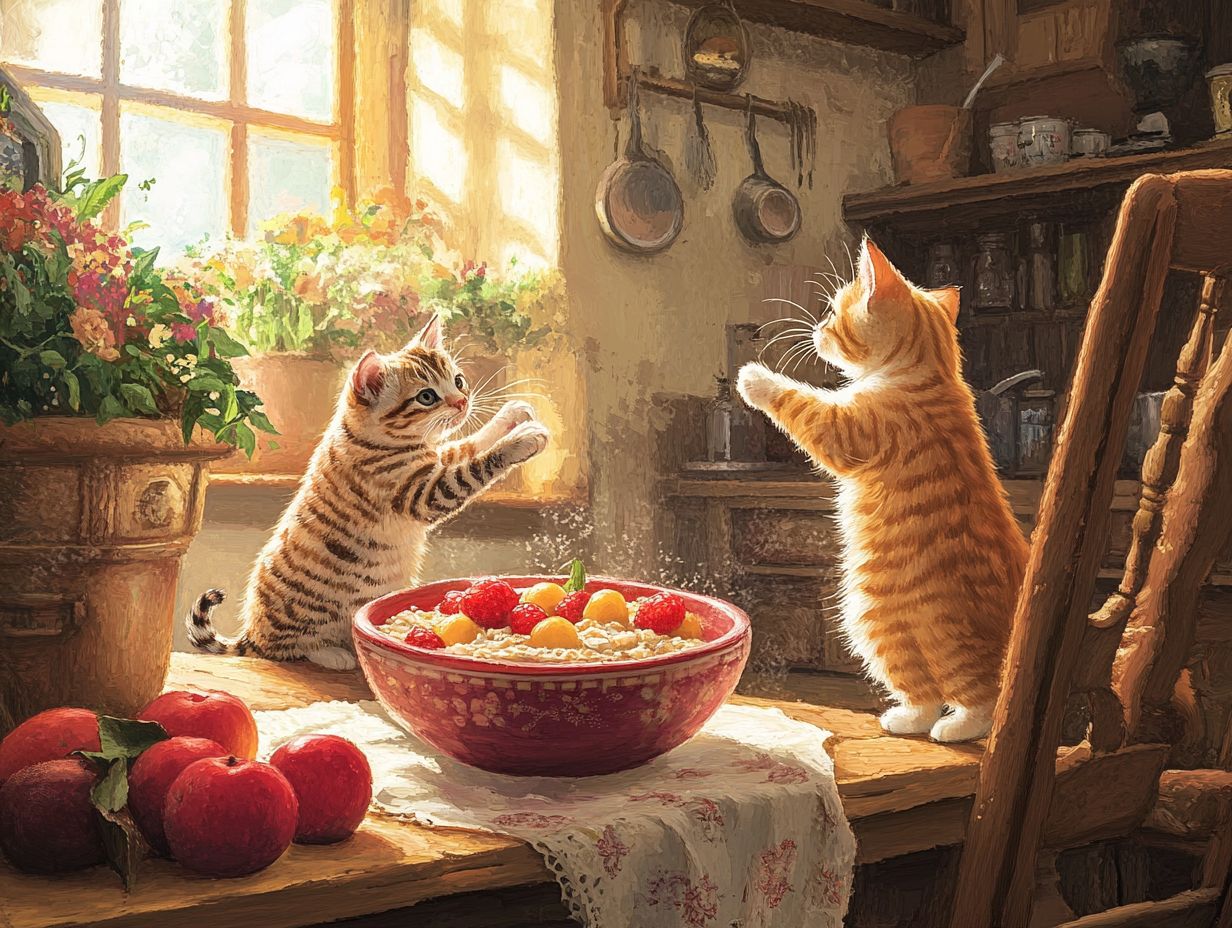Porridge oats, including raw oats and cooked oatmeal, are a popular breakfast staple. Are porridge oats a healthy treat for your cat? This article will help you determine if they can be safely included in your feline friend’s diet. Remember to consider your cat’s individual dietary needs and consult your veterinarian.
In this article, you’ll learn what porridge oats are, their nutritional benefits, including carbohydrate and protein content, and how to incorporate them into your cat’s meals safely.
We break down the macronutrients, discuss potential benefits and risks, and offer tips for feeding oats to cats. Plus, you’ll discover alternative healthy options, such as high-protein cat treats like Royal Canin and Hill’s Science Diet, which are more suitable for a species-appropriate diet.
With this information, you’ll be able to decide if porridge oats could be a tasty and occasional treat addition to your cat’s menu!
Key Takeaways:
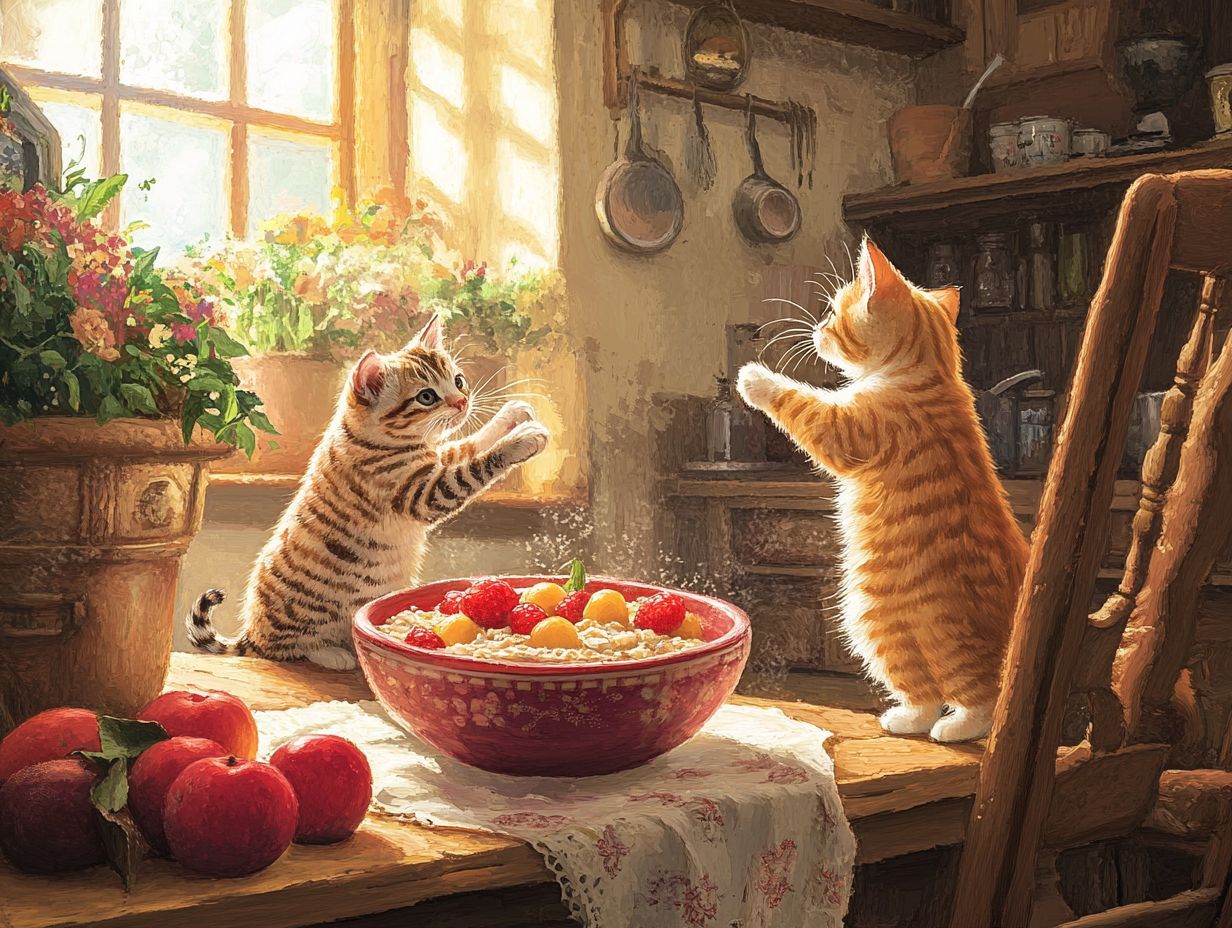
- Porridge oats provide essential nutrients like fiber and protein, but they should never replace a meat-based diet as a staple.
- Small amounts may benefit cats, but consult with a veterinarian and monitor for any digestive issues.
- Start with a teaspoon mixed into their regular food to monitor for any adverse reactions.
- Excessive intake can lead to digestive issues; consult a veterinarian before making dietary changes. A small amount, no more than 1-2 teaspoons, can be offered occasionally.
What Are Porridge Oats and Can Cats Eat Them?
Understanding porridge oats is essential for pet owners who wish to provide healthy alternative food options for feeding cats. Porridge oats, also known as oatmeal, can be a nutritionally beneficial addition to select diets, offering health benefits when properly prepared.
However, it’s important to note that cats are obligate carnivores and primarily require a protein-rich, meat-based diet to obtain the necessary nutrients. By being informed about porridge oats, pet owners can ensure their cats’ digestive health remains uncompromised.
What are Porridge Oats?
Porridge oats are made from raw oats that can be cooked to create a warm dish often enjoyed for breakfast. They are derived from the whole grain of the oat plant, which is processed to remove the inedible outer husk.
This processing may involve steaming and rolling the oats, resulting in various forms such as steel-cut, rolled, and instant oats. Cooked oatmeal transforms the raw oats into a mixture with a soft, velvety texture and a hearty bite, offering both flavor and a rich nutritional profile.
Nutritional Value of Porridge Oats
Porridge oats are nutritionally valuable as they provide essential fiber, vitamins, and minerals necessary for health. However, their high carbohydrate content may not meet a cat’s protein needs effectively.
Macronutrient Breakdown
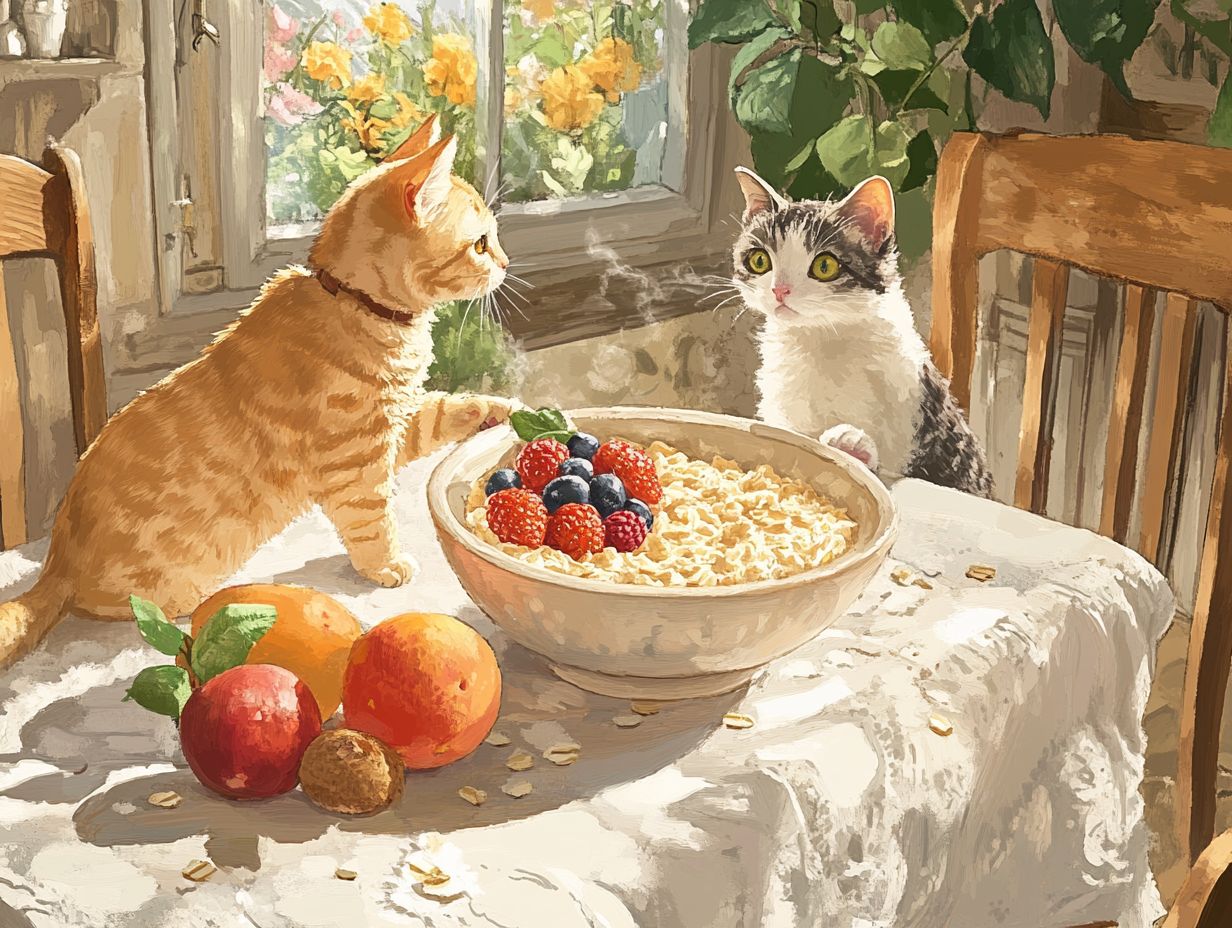
The macronutrient profile of porridge oats consists of approximately 66% carbohydrates, 12% protein, and 8% fiber, essential for digestive health. While the protein quality is less than that found in meat sources, it can still contribute to daily intake.
Can Cats Eat Porridge Oats?
Yes, cats can safely consume porridge oats in small quantities as an occasional treat. However, ensure they do not have any underlying medical conditions that could lead to digestive upset.
Learn more about whether cats can eat porridge oats.
Benefits of Porridge Oats
Feeding porridge oats to cats can provide several health benefits, including added fiber that aids digestive health and may enhance gut health and regularity.
Risks of Feeding Oats
However, there are risks, such as excessive carbohydrates and insufficient protein content, which could lead to malnutrition. Remember, cats need a diet mainly made of meat for optimal health.
Feeding Porridge Oats to Cats
When offering oatmeal to cats, ensure it is plain and free from additives or any potentially harmful ingredients.
How to Safely Incorporate Oats into Their Diet
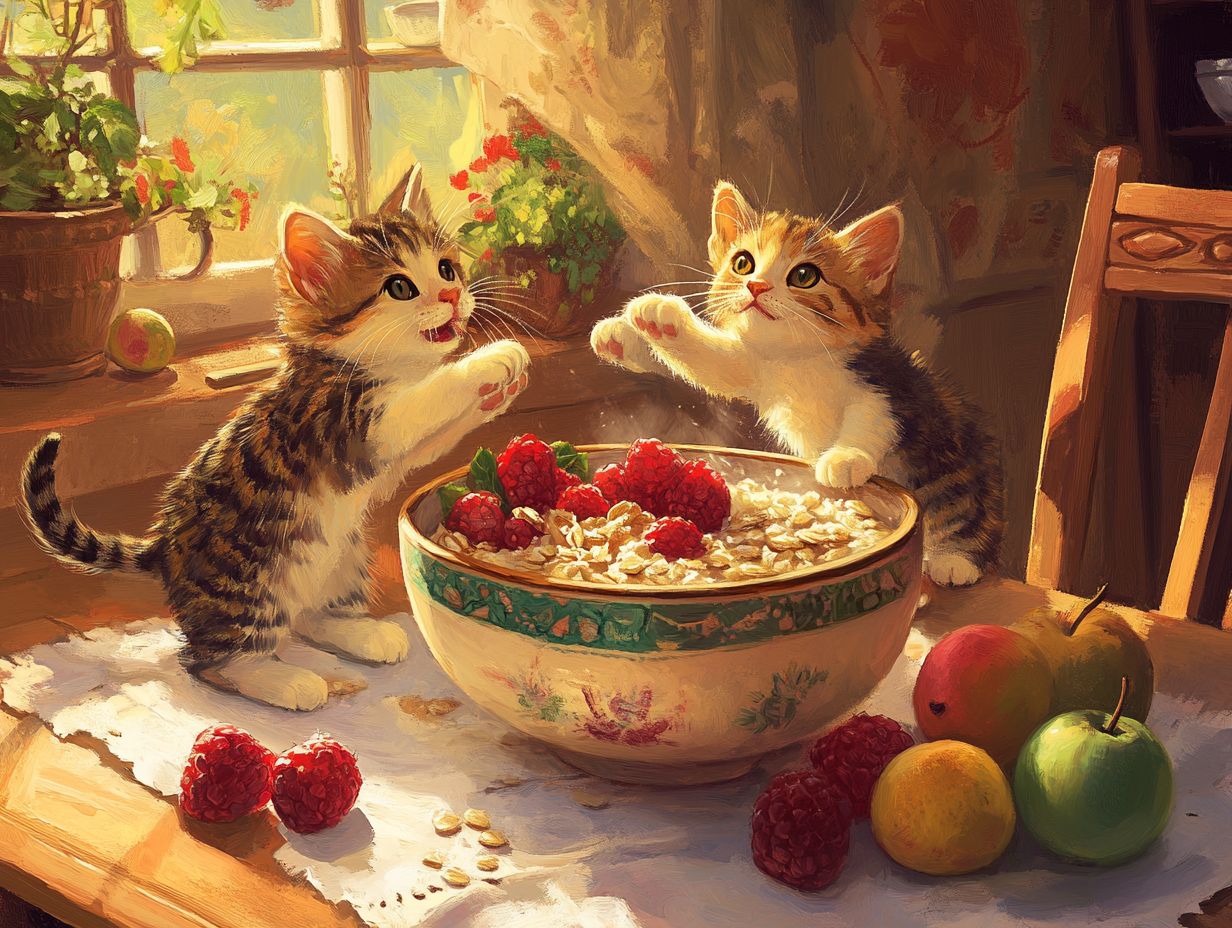
To safely incorporate porridge oats into a cat’s diet, follow these steps:
- Start with small servings: Offer your cat a teaspoon of cooked oatmeal.
- Introduce gradually: Slowly increase the amount in your cat’s diet.
- Choose unflavored and unsweetened varieties: Plain oats are the best choice.
- Avoid harmful ingredients: Do not add sugar, salt, or butter.
- Cook oats in water: Prepare oatmeal with water instead of milk.
- Complement a balanced diet: Remember that oats should supplement a balanced, meat-based diet.
Alternatives to Porridge Oats for Cats
Porridge oats should not be given frequently. Healthier alternatives more suitable for their diets include high-protein commercial cat food or cat treats rich in omega fatty acids.
Other Healthy Options
Other healthy options include specially formulated treats and diets that are rich in protein, vitamins, and minerals. These alternatives support overall health and vitality.
Diets enriched with high-quality protein sources like chicken, turkey, or fish significantly contribute to muscle maintenance. Foods high in omega fatty acids promote healthy skin and coat.
Selecting the right combination of healthy foods is essential for fostering a long and energetic life for our feline companions.
Frequently Asked Questions
Can cats eat porridge oats?
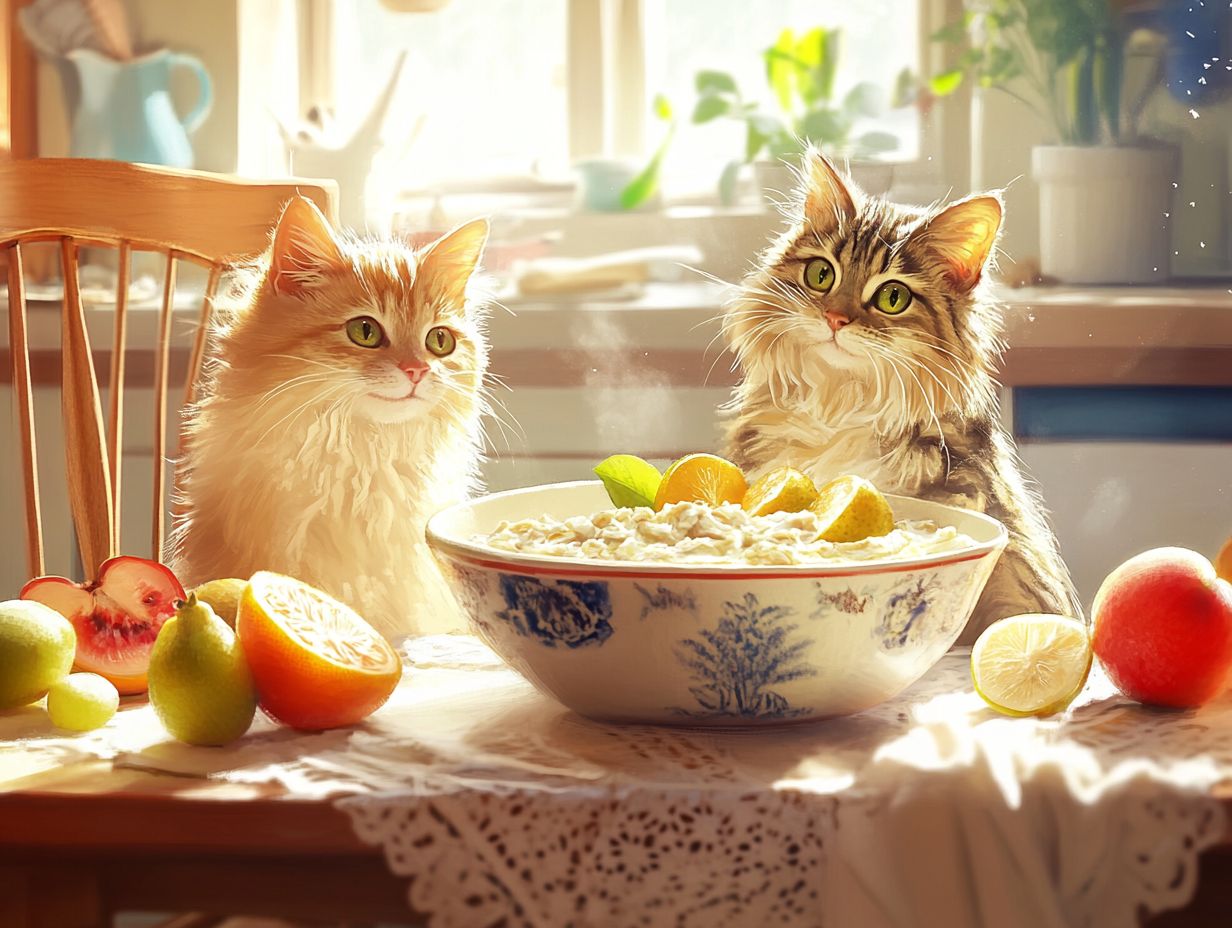
Signs of Digestive Upset
If you notice any signs of digestive upset, such as vomiting or diarrhea after feeding porridge oats, discontinue offering them and consult your veterinarian.
Always consult a veterinarian before making significant dietary changes for your pets to ensure their health and well-being.
Is porridge oats a healthy option for cats?
In moderation, porridge oats can provide some health benefits for cats, including fiber, protein, and essential vitamins and minerals. However, it should not substitute a balanced and species-appropriate diet.
Why is it not recommended for cats to eat porridge oats regularly?
Cats need a diet primarily composed of meat. Porridge oats do not provide all the necessary nutrients, and too much can lead to digestive issues.
Can porridge oats be harmful to cats?
In large quantities, porridge oats can cause gastrointestinal problems and may pose a choking hazard.
How should porridge oats be prepared for cats?
If you feed porridge oats to your cat, ensure they are cooked and plain with no added ingredients. Offer one teaspoon of cooked oats once a week, cooled to avoid burns.
Are there any alternatives to porridge oats for cats?
Yes, options include high-quality cat food, lean meats, and some fruits and vegetables better suited for cats. Consulting with your veterinarian is recommended.
Conclusion
Always prioritize a balanced, species-appropriate diet for your cat. While porridge oats can be a rare treat, they should never replace essential nutrients found in a meat-based diet.
Dos and Don’ts of Feeding Porridge Oats to Cats
- Do start with small amounts.
- Do consult your veterinarian.
- Don’t add sugar or salt.
- Don’t replace a meat-based diet.
